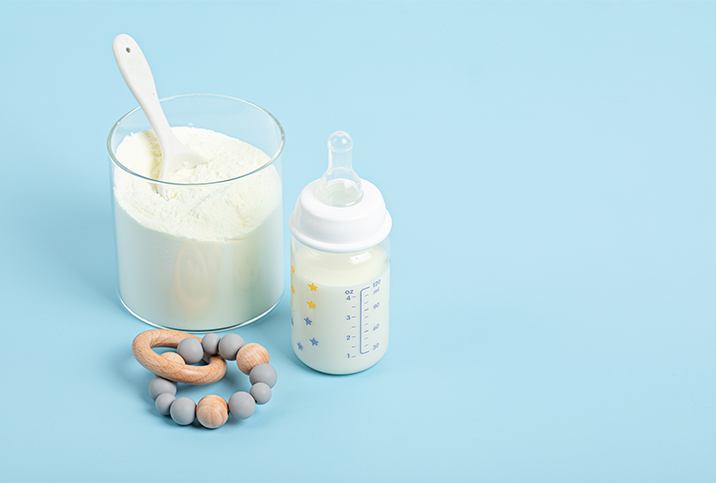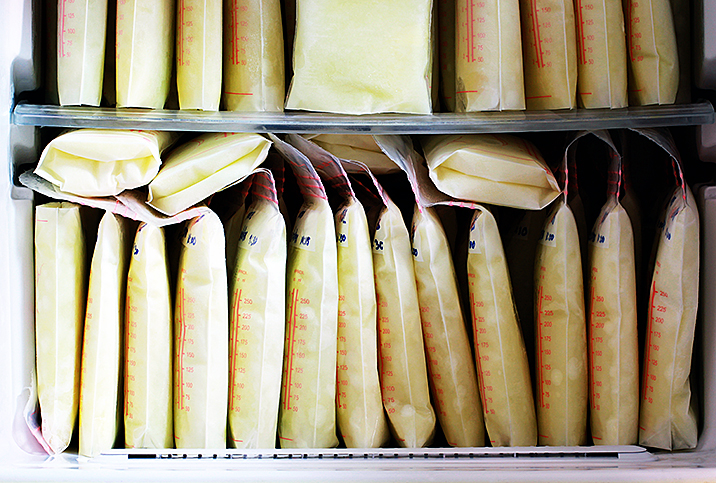There's Still a Shortage of Baby Formula

In spring 2022, parents of formula-fed infants were horrified to find store shelves that had once been fully stocked with popular brands of baby formula had become bare. One plant in Michigan, Abbott Nutrition, which makes Similac, shut down in February for months following bacterial contamination of some of its powdered formulas. Multiple varieties of Similac were recalled and pulled from shelves. Several babies were sickened by the bacteria, and at least two babies died. Difficulty finding ingredients for formula, due to ongoing supply-chain issues, was also cited as one culprit for the shortage.
At the height of the shortage in the spring and summer, desperate parents hunted for alternatives, from switching formula brands to scouring Facebook groups, just so they could perform their most basic role as caregivers: feeding their children.
"I've been a pediatrician for 25 years now and I don't recall ever having an issue like we did this past summer," said David Berger, M.D., a board-certified pediatrician and owner and medical director of Wholistic Pediatrics & Family Care in Tampa, Florida. "So something very wrong went down at this plant that they were not doing the proper regulation that was necessary to make sure that something like this doesn't happen."
While production at the Michigan plant has resumed—and Abbott announced in October its plans to build a new $500 million factory to make specialty formulas—formula supply still isn't back to its previous levels.
Parents and experts alike have lingering questions: How can manufacturers and regulators ensure this never happens again? And what can parents do to keep their children fed?
What is Cronobacter?
An infection from Cronobacter sakazakii, the bacteria that contaminated powdered formula at the Abbott plant, is rare but can be fatal in infants, according to the Centers for Disease Control and Prevention (CDC).
Cronobacter is found naturally in the environment. It can live on surfaces—kitchen counters and sinks, for instance—and can grow in dry foods, such as powdered formula. When formula becomes contaminated in the home, it's often from the scoop coming into contact with Cronobacter on a surface and then being dipped into the formula. In manufacturing facilities, contamination occurs when contaminated ingredients are introduced to the batch or the powdered formula comes into contact with a contaminated surface.
About two to four cases of Cronobacter infection are reported to the CDC each year, though those figures may not reflect the actual number. An infection can cause sepsis and meningitis. Infants are most at risk, particularly those who are younger than 2 months of age, are premature or have a weakened immune system.
While the Food and Drug Administration (FDA) maintains strict regulations on baby formula, powdered baby formula is not sterile. In fact, no food is sterile, not even breast milk, Berger said.
"There's still bacteria coming off the breast, which can be in the milk," he said.
In order to make baby formula truly sterile, it would need to be heated to boiling. But this high temperature would also destroy its vital nutrients, essentially resulting in regular milk.
"Typically, they say 165 degrees is what you need to kill the bacteria, but over 120 degrees is when you start to degrade the nutrients," Berger said.
Who's been affected by the formula shortage?
Jessica Madden, M.D., a board-certified pediatrician and neonatologist and international board-certified lactation consultant (IBCLC) at Primrose Newborn Care in Cleveland, witnessed families' fears of not being able to feed their babies.
"I do a lot of newborn home visits and I've had a ton of patients affected," Madden said. "I also work in a neonatal intensive care unit. We were really affected by shortages of the specialty formulas for premature babies. At least where I am, in Northeast Ohio, it had an effect on the majority of formula-feeding families."
She added: "All of these new parents, they were confronted with not having the ability to feed their babies, which is horrifyingly scary. And at the same time, there was a lot of messaging going on that I think contributed to a lot of guilt for families who were not breastfeeding, because I heard multiple times people make comments like, 'Oh, well, if they had just breastfed, they wouldn't have ended up in this situation,' which is exactly the opposite of how to support families in the midst of a crisis."
Families who got formula through the Women, Infants and Children (WIC) supplemental program were also disproportionately affected, she said. Some families could afford to stockpile months' worth of formula or buy direct-to-consumer or other specialty brands not covered by WIC.
The FDA relaxed its rules to allow formula brands from Europe, Australia and other parts of the world to begin selling their products in the U.S. to help bridge the gap from the shortage. Still, while these brands are now WIC-eligible formulas, many of them aren't sold in major retail outlets.
What can parents do?
Both doctors encouraged expectant parents to try to breastfeed, which is also aligned with recommendations from the World Health Organization (WHO) and the American Academy of Pediatrics (AAP).
But Madden recognized that's not a reality for every family and this advice doesn't help parents who weren't already breastfeeding.
"I'm a lactation consultant, so don't get me wrong: I am a huge advocate of breastfeeding," she said. "But to try to solve the problem by telling a mom of a 3-month-old baby who's being formula-fed, 'OK, just go relactate,' but not giving her any tools to be able to do that or resources or help, you're asking parents to do the impossible."
Parents should be flexible about the type of formula they use, as many babies do fine on a different brand, even a store brand, which Madden used herself without hesitation when one of her own children needed formula supplementation.
Parents should not attempt to make homemade formula or dilute formula to "stretch" it out longer.
"If you water down either liquid concentrate or powder formula, it can create an electrolyte imbalance, which in babies can be life-threatening," Madden said.
Another item on the "don't list"? Stockpiling formula when it's available.
"Yes, you definitely want to have a few weeks of formula on hand, but there's absolutely no reason that you need three or four months," Madden said. "Think about the other families, too, that have to feed their babies."


















